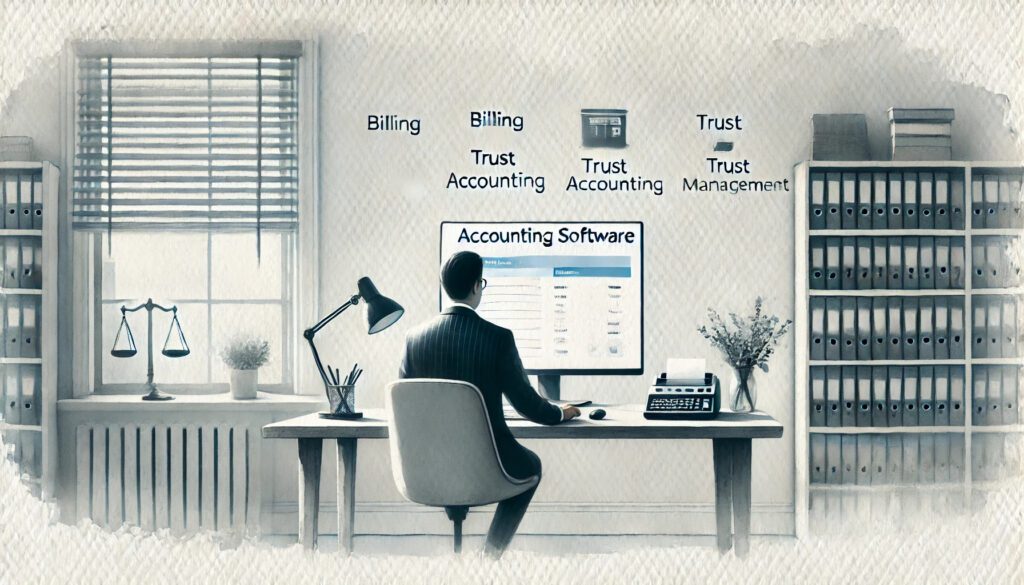Introduction
Effective financial management is crucial for any business, including small law firms. Accurate accounting ensures compliance, optimizes billing, and enhances overall operational efficiency. However, traditional accounting methods can be cumbersome and prone to errors. This is where accounting software tailored for small law firms comes in, offering a streamlined, automated solution to manage finances effortlessly.
What is Accounting Software for Small Law Firms?

Accounting software for small law firms is a specialized tool designed to handle the unique financial needs of legal practices. It includes features like client management, billing and invoicing, trust accounting, expense tracking, and compliance management. These tools help law firms manage their finances accurately and efficiently, ensuring they meet all regulatory requirements.
Why Small Law Firms Need Specialized Accounting Software
Small law firms face specific challenges such as handling client funds, managing multiple cases simultaneously, and ensuring compliance with strict legal standards. General accounting software may not cater to these unique needs. Specialized accounting software addresses these challenges by providing legal-specific solutions, ensuring accuracy, and saving valuable time.
Key Features to Look for in Accounting Software
Client Management
Effective client management is essential for law firms. Look for software that integrates CRM capabilities, allowing for seamless communication and document management.
Billing & Invoicing
Automated billing and custom invoicing features help streamline the payment process, making it easier to track billable hours and manage client payments.
Trust Accounting
Handling trust accounts requires meticulous attention to detail. Trust accounting features ensure compliance with legal standards and help manage client funds accurately.
Expense Tracking
Track expenses effortlessly with features like expense categorization, receipt management, and bank account integration.
Compliance Management
Ensure your firm complies with legal and financial regulations with built-in compliance management tools.
Financial Reporting
Generate customizable reports to gain insights into your firm’s financial health, track key performance indicators, and make informed decisions.
Top Accounting Software Options for Small Law Firms
QuickBooks
A popular choice for many small businesses, QuickBooks offers robust accounting features, integration capabilities, and an intuitive interface.
Clio
Clio provides comprehensive legal practice management software, including accounting features tailored for law firms.
Xero
Xero is known for its user-friendly interface and powerful accounting tools, making it a great option for small law firms.
MyCase
MyCase combines practice management and accounting features, offering an all-in-one solution for small law firms.
CosmoLex
CosmoLex is designed specifically for law firms, providing end-to-end accounting and practice management features.
Comparison of Popular Accounting Software
Compare features, pricing, pros, and cons of each software to find the best fit for your law firm.
| Software | Features | Pricing | Pros | Cons |
|---|---|---|---|---|
| QuickBooks | Robust accounting, Integration capabilities | Varies by plan | Intuitive interface, Trusted brand | Limited legal-specific features |
| Clio | Comprehensive practice management, Legal-specific accounting | Subscription-based | All-in-one solution, Legal compliance | Higher cost |
| Xero | User-friendly, Powerful accounting tools | Subscription-based | Affordable, Strong support | Learning curve |
| MyCase | Practice management and accounting | Subscription-based | All-in-one, Easy to use | Limited customization |
| CosmoLex | End-to-end legal accounting | Subscription-based | Legal-specific features, Comprehensive | Higher cost |
Client Management and Integration
Client management features, including CRM integration and document management, are crucial for maintaining efficient operations and excellent client service.
Billing and Invoicing
Automated billing and custom invoicing options make it easy to track and manage client payments, ensuring timely and accurate billing.
Trust Accounting
Trust accounting is a critical feature for law firms, ensuring that client funds are managed in compliance with legal standards.
Expense Tracking and Management
Efficient expense tracking helps law firms manage their finances better, with features like expense categorization and receipt management.
Compliance and Security Features
Data security and regulatory compliance are paramount for law firms. Choose software with robust security features and compliance management tools.
Financial Reporting and Analysis
Customizable financial reports and dashboards provide valuable insights into your firm’s financial health and performance.
Ease of Use and User Experience
A user-friendly interface and excellent customer support can make a significant difference in the adoption and effective use of accounting software.
Scalability and Flexibility
As your firm grows, your accounting software should scale with you, offering customization options and multi-user access.
Mobile Accessibility and Remote Access
Cloud-based solutions and mobile apps ensure that you can access your accounting software from anywhere, enhancing flexibility and productivity.
Cost Considerations
Evaluate the pricing models, hidden fees, and return on investment when choosing accounting software for your law firm.
Integrations with Other Tools
Ensure your accounting software integrates seamlessly with other tools like case management software, time tracking tools, and payment processors.
Customer Support and Training
Excellent customer support and comprehensive training resources are essential for smooth implementation and ongoing use of accounting software.
Case Studies and Success Stories
Explore case studies and success stories to see how other small law firms have benefited from using accounting software.
Future Trends in Legal Accounting Software
Stay ahead of the curve by understanding future trends such as AI and automation, blockchain technology, and predictive analytics.
Choosing the Right Software for Your Law Firm
Conduct a needs assessment, take advantage of trial periods, and consider vendor reputation when selecting accounting software.
Implementation Tips
Plan and prepare for implementation, ensure smooth data migration, and train your staff to get the most out of your accounting software.
Common Pitfalls and How to Avoid Them
Avoid common pitfalls like data security risks, overlooking key features, and ignoring user feedback by being proactive and thorough in your selection process.
FAQs
What are the benefits of using accounting software for small law firms? Accounting software streamlines financial management, ensures compliance, and saves time, allowing lawyers to focus on their core tasks.
How do I choose the right accounting software for my law firm? Consider your firm’s specific needs, compare features, pricing, and read reviews. Take advantage of trial periods to test the software.
Can accounting software integrate with other tools my law firm uses? Yes, many accounting software options offer integrations with case management, time tracking, and payment processing tools.
Is cloud-based accounting software secure? Reputable cloud-based software providers implement robust security measures to protect your data.
What features should I look for in accounting software for law firms? Look for features like client management, billing and invoicing, trust accounting, expense tracking, compliance management, and financial reporting.
How can accounting software help with compliance? Accounting software ensures that your financial practices adhere to legal and regulatory standards, reducing the risk of non-compliance.
Conclusion
Choosing the right accounting software for your small law firm can significantly enhance your financial management, ensuring compliance, and improving overall efficiency. By understanding your needs and evaluating the available options, you can find a solution that meets your specific requirements and supports the growth of your practice.

